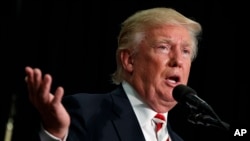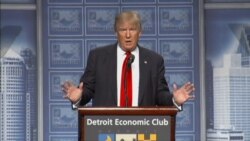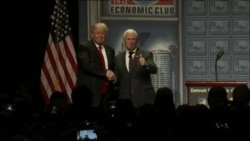U.S. Republican presidential candidate Donald Trump outlined his economic plan Monday, saying he wants to "jump-start" the American economy with new tax cuts, curbs on government regulation and efforts to boost the fortunes of middle-income workers
Trump, a real estate tycoon seeking his first elected office, called his Democratic opponent, former U.S. Secretary of State Hillary Clinton, "the candidate of the past," who was wedded to higher taxes, more restrictions on businesses and tighter controls on energy development.
"I want to jump-start America and it can be done," Trump told the Detroit Economic Club, in the Michigan city that is the hub of U.S. auto manufacturing. He was interrupted several times by protesters, who were led out of the venue.
WATCH: Trump on jump-starting America
Tax cuts
Trump drew cheers from business executives with a call to cut the 39 percent U.S. corporate tax rate, the third-highest in the world, to 15 percent.
"I am going to cut regulations massively," Trump pledged. "I want wealth to stay in America. We are in competition with the world and I want America to win."
He vowed to simplify the tax system for individual taxpayers, saying that "for many Americans, their tax rate will be zero."
Trump attacked U.S. trade deals, including the proposed 12-nation Trans-Pacific Partnership, claiming that Clinton will eventually support the pact even though she has declared her opposition to it. "I am totally in favor of trade deals," Trump said, but only if they benefit U.S. workers. He said he would re-negotiate the North American Free Trade Agreement the U.S. has with Canada and Mexico, and that "if we don't get a better deal, we will walk away."
"Americanism, not globalization will be our new credo," he said.
He accused Clinton of being "all talk, no action" when she promised to create 200,000 jobs in New York state when she served as a senator there a decade ago.
Falling poll numbers
Trump, coming off a week of controversial comments and falling poll numbers in his race for the White House, hoped to use the speech to reset his campaign three months ahead of the November 8 national election to pick the successor to President Barack Obama when he leaves office next January. Clinton, a former U.S. secretary of state, is speaking to the same group Thursday about her economic plans.
They both are hoping to boost the U.S. economy, the world's largest. It remains one of the world's most envied as economies elsewhere stagnate or falter, but it has not hit three percent annual growth since 2005, a rate that many economists consider to be a sign of a robust economy.
Ahead of Trump's speech, one of his economic advisers, Stephen Moore said, "We need much, much faster growth if we're going to have wages rising and salaries rising and middle-class incomes rising. How do we get back to a healthy rate of economic growth which we haven't had in a decade?"
Trump is also calling for a temporary moratorium on new government regulations, revival of a proposal for an oil pipeline running from Canada through the central United States that Obama rejected, and elimination of the country's tax on big estates when wealthy people die.
Clinton also laying out economic plan
Clinton is spending Monday in the southeastern state of Florida, touring a small brewery and holding two rallies. In her speech Thursday, aides say she will lay out plans for "the biggest investment in good-paying jobs" since World War II.
In recent days, she has called for boosting U.S. spending to fix U.S. highways, upgrade airports and fund new infrastructure projects.
Both of the candidates' economic plans would be costly. Clinton has called for new taxes on the highest-income earners to help pay for hers. Trump has yet to spell out options to fund his proposals, and analysts say that his earlier tax-cutting plans would dramatically increase the country's $19 trillion national debt, adding as much as $10 trillion to the figure during the next decade.
Former U.S. Speaker of the House of Representatives Newt Gingrich, whose support of Trump has been lukewarm, was asked on Fox News Sunday if Trump's plans are economically sound.
"Of course not ... no candidate's numbers add up," Gingrich said.
Latest polls: Clinton leads Trump
In the week since the end of the Republican and Democratic national conventions, national polls show Clinton, seeking to become the country's first female president, pulling to a seven-percentage point advantage over Trump, 47.5 to 40.5 percent, according to an average compiled by realclearpolitics.com. But voters rate the two more evenly on the question who could best handle the U.S. economy.
Trump has boosted her recent gain with a series of comments many voters have rejected, including his criticism of a Muslim-American couple whose son, a U.S. Army captain, was killed in Iraq. The couple said Trump had made no sacrifice to the United States that was comparable to their loss.
Trump responded that he had sacrificed by adding "thousands of jobs" to the national economy.















